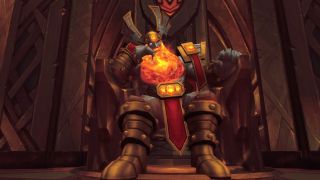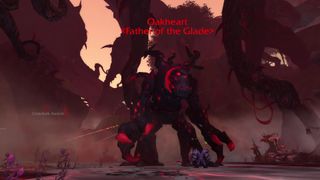Playing a tank in World of Warcraft brings out the best and worst of its community
The stresses and frustrations of having to be the one person in the group everyone relies on.

In the Halls of Valor, I'm about to reach a breaking point in World of Warcraft: Legion. This is the first time I've run the dungeon on 'Mythic' difficulty, a nightmarish gauntlet where Blizzard throws all of its cruelest ideas at players in exchange for awesome loot. But every tip from the countless guides I've read couldn't have prepared me for the monsters inside. It's not the bloodthirsty, viking-like Vrykul but the player that's berating because I am a "piece of shit tank" and "cancer."
These words actually manage to hurt my feelings because there's a tiny sliver of truth to them. This is my second week learning how to tank in Warcraft. It's bad enough that I have to learn every dungeon and every boss encounter inside and out just to be effective, but I also have to navigate the insults and frustration that happens when I fail and let the group down. It's a heavy burden to bear, and it's bringing me face to face with one of Legion's biggest problems.
Tanks for nothing
In Warcraft, each player fills a specific role in a group. One player tanks, grabbing and holding the attention of monsters and soaking up their damage. Three players are called the DPS, and their job is to deal damage and kill monsters. Finally, keeping us all alive is the healer, whose job is often just as intense as the tank's. When these three roles work together, it feels like a ballet—an incredible and precise choreography of teamwork that can defeat any boss that might threaten us. Sadly, finding that rhythm is rare when I'm using Warcraft's 'party finder' tool to join groups of strangers, and that's when a fun night of dungeon diving can turn ugly.
It's a faulty philosophy perpetuated by game design that encourages selfishness in a genre that is supposedly all about community.
As a tank, I am often the first to be criticized when something goes wrong. The tank acts as the de facto leader of the group by pulling and holding monsters' attention. It's up to me to set the pace as we clear the dungeon. But more than knowing how much the party can handle at once, I need to know where those monsters need to be positioned, what direction they should face, and what abilities they can use that might threaten the group. I'm also expected to stay on top of all the current meta strategies for beating a dungeon. When shortcuts are found that let players skip monsters, I need to know them. It's a lot to stay on top of.
For the average player, it's no surprise that playing a tank feels overwhelming. But it's not the responsibility of having to intimately know each dungeon—an element that I really enjoy—but the constant pressure of being an inexperienced leader where one bad mistake punishes the entire group. I bear the weight of knowing when I'm ruining the experience for other players.
Understandably, this has led to a scarcity of people willing to wear that heavy crown. When queueing for the party finder, DPS characters can expect to wait over half an hour to find a group to join. There's just too many of them. Tanks and healers, on the other hand, are in such high demand that their queue rarely takes more than a minute. That's what initially led me to shifting from a DPS character to a tank, but I'd be lying if I haven't thought about switching back more than a few times these past weeks.
Dismal dungeons
As much as verbally harassing strangers on the internet is tasteless, I also can't help but sympathize when a player gets angry at me. After all, my failures are actively wasting their time and no one wants to spend 40 minutes clearing a dungeon that should take 20. But that problem isn't because of the toxic people that tend to exist in any online game, but the design of the game itself.
Comic deals, prizes and latest news
Sign up to get the best content of the week, and great gaming deals, as picked by the editors.
World of Warcraft, like most MMOs, features an endgame that focuses on replaying the same handful of dungeons and raids again and again for progressively better rewards. By the time new dungeons are released in future patches, active players will easily have run the old ones hundreds times. With each run, that dungeon becomes less of a challenge and more of a routine. It's only natural that players would want to get through it as quickly as possible, and when I, as a new tank, get in the way of that, I understand why that can be frustrating. If your time is limited in an evening, you're often better off leaving a struggling group and finding a new one than sticking it out—even if that's considered rude.
It's a faulty philosophy perpetuated by game design that encourages selfishness in a genre that is supposedly all about community. Instead of focusing on making the journey satisfying, World of Warcraft puts all emphasis on the destination and how quickly you can get there. Frankly, that puts me in an awkward position. Though I want to learn to tank, I also don't want that learning to impede the progress of the players who are grouped with me.

Due to the difficulty of Mythic dungeons, there's no automatic matchmaking tool in order to enter them. Instead, players must rely on a 'group finder' tool that lets them create and advertise a group, giving them more control about the players that enter this party. Typically, this means rooting out poorly geared characters, but it also has one benefit that is finally making my journey to learn how to tank bearable.
Thanks to a tip from the community, I've started creating my own groups and naming them as "learning parties" and clarifying that players can expect to die once or twice as we work through the dungeon. Where partying up in Warcraft had led me to be apprehensive of the community, seeing every player in my group as a potential harasser, my experience with learning parties has been almost universally positive.
As it turns out, I'm not alone in World of Warcraft—there's thousands of players just like me who are terrified of its sink or swim philosophy toward dungeons. Every time I make a learning party, it quickly fills up with people who just want a safe place to fail and learn. During one of those runs, a DPS character chewed me out for messing up the timing on a boss's ability that had killed the group a few times in a row. For a brief moment, that guilt crawled back in until the other players in the party began standing up for me.
That character ultimately left the group, but not before hurling a few more insults at me. But as he left, another character sent me a private message. "Don't worry man, you're doing great," they wrote. When our replacement arrived a minute later, that same player explained that I was learning and that they needed to be patient or leave.
"No problem :)," they wrote back.
It's hard to fully express how much that attitude changed my perception of failure. Instead of feeling intimidated and ashamed for wasting my party's time, I felt encouraged and resolved to do the best I could. It took another attempt, but when that boss finally died, I felt a kind of high I hadn't experienced in MMOs in a long time. I felt unstoppable.
Tanking in World of Warcraft has been one of the most conflicting journeys I've taken in gaming. I finally feel like I've climbed that hump and can reliably tackle every dungeon on Mythic difficulty, but getting to that point has been painful. And while I would love to live in a fantasy world where strangers are polite and empathetic with those they meet online, I'd much rather see developers like Blizzard take a serious look at the ways their games reinforce negative behavior.
[World of Warcraft] turns its community on itself by positioning those who want to improve against those who just want their gear as quickly as possible.
The fact that tanks are in such high demand tells of a troubling issue in the way they're designed. While some players will never want to take on the responsibility, there are many, like me, who love diving into the nitty-gritty of a game. But the problem is that World of Warcraft does little to help new tanks learn and grow. Even worse, it turns its community on itself by positioning those who want to improve against those who just want their gear as quickly as possible. It's an awkward tension that doesn't need to exist.
Like a game of Dungeons and Dragons among friends, running a dungeon in World of Warcraft is supposed to be an exciting and challenging place to grow together as a group. But that focus on repetition and reward doesn't inspire teamwork and sociability. It enforces a mentality that those I group with are simply a tool and when that tool isn't working as it should, it needs to be discarded. Now that I'm capable, I'm loving tanking in World of Warcraft, but I'd be damned if I'd ever go the process of learning all over again.
With over 7 years of experience with in-depth feature reporting, Steven's mission is to chronicle the fascinating ways that games intersect our lives. Whether it's colossal in-game wars in an MMO, or long-haul truckers who turn to games to protect them from the loneliness of the open road, Steven tries to unearth PC gaming's greatest untold stories. His love of PC gaming started extremely early. Without money to spend, he spent an entire day watching the progress bar on a 25mb download of the Heroes of Might and Magic 2 demo that he then played for at least a hundred hours. It was a good demo.
Most Popular



